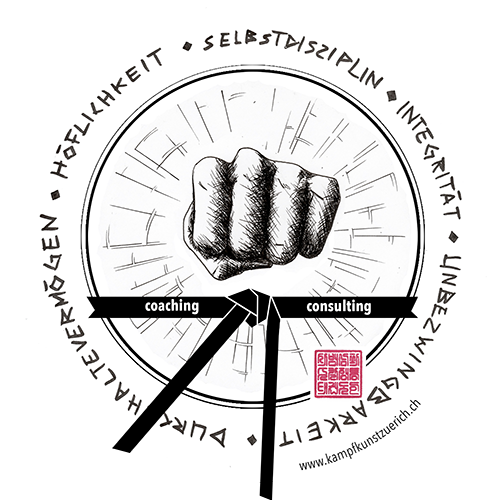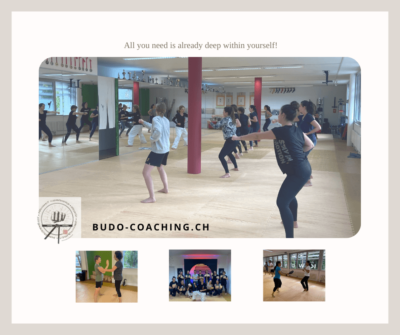Open up to your world of possibilities Do you find yourself constantly worrying about what…

Strengthen assertiveness: 5 tips with martial arts as a role model
Communicating the Budo way
Imagine you are in a meeting and there is someone constantly interrupting you, making fun of your suggestions and not taking you seriously…. At some point you realize that your inner limit has been reached, your inner red line starts blinking. You feel this is the point where you should speak up, but instead, you keep silent just to regret it afterwards.
In martial arts the red line is clearly defined – we learn to treat others with respect, but when the red line is crossed, we step up.
When is your red line crossed and how do you become aware of it?
It may occur to you that your personal boundaries are often violated – you get upset, but don’t find the courage to intervene. If If you pay attention to your own inner red light however, this will ensure:
- that no one oversteps your boundaries
- that the right tone is preserved
- that no one is insulted, treated unfairly, or excluded
If you are assertive, you express yourself effectively and make your point while respecting the opinions of others. Not everyone is naturally assertive and learning to speak or say no with ease takes some practice.
Practicing assertiveness not only improves your communication skills, but also has a positive impact on your self-esteem and the way you are perceived from others.
If you want to progress in life, in addition to your professional expertise, it is important to that you learn how to stand your ground. Confidence is key.
Martial arts as a role model to learn fighting spirit
Respect is a basic rule in martial arts. This applies to everyone, regardless of rank; Treating each other with respect ensures that we fight fairly, that everyone is treated as equals and that, for example, someone with a black belt does not abuse their strength and experience against a beginner.
Martial arts use assertiveness to avoid violence. Contrary to what is often portrayed in films, the martial arts path actually advocates non-violent confrontation.
“The ultimate aim of martial arts is not having to use them.”
Miyamoto Musashi-Samurai fighter
Being assertive means communicating more effectively and constructively and at the same time showing the willingness to work on solutions from a position of strength which comes from the inside.
What you say – your message – but also how you say it is just as important. Assertive communication is direct and respectful. If you communicate too passively or too aggressively, your message will not get through.
The same is taught in martial arts training. If you are too aggressive during sparring, you allow your emotions to take control; If you are too passive, you will lurk, hesitate and leave the outcome to chance.
However, if you are aware of your own strength and neither overestimate nor underestimate yourself or your opponent, you can act with a clear head and measure yourself fairly. In the verbal battle, it’s no different: Instead of being submissive or aggressive, assert yourself politely but firmly, stating your points. This also requires a certain mental flexibility and sometimes a willingness to compromise.
❌ Passive attitude
“Yes-men,” submissive or passive people cast themselves into the victim role, because they come across as fearful, shy, and unable to stand up for themselves.
If you tend to always say yes or accept any suggestion, even if you disagree inside yourself, you are also sending the message that your thoughts and desires are not as important as those of others. If you don’t speak your mind, you give others license to ignore your wants and needs. No wonder this leads to resentment, frustration, stress and dissatisfaction.
❌ Aggressive attitude
On the other hand, if you are too aggressive, you will assert yourself against others with violence. For example, certain leaders ignore the needs, feelings, and opinions of others simply because of their position of power. Theycome across as self-righteous, arrogant, and overbearing. Very aggressive people can even become physically threatening, intimidating, silencing, and overpowering others through coercion. However, bossing people around, or worse, threatening them, undermines trust and mutual respect and only leads to rejection and disruption.
“If two tigers fight, one will surely be maimed and one will die.”
Gichin Funakoshi – Founder of Karate
✅ Assertiveness
Standing up for yourself does not mean being aggressive and overruling, but rather communicating clearly, with confidence and conviction. It’s not about dominating certain situations, but about being aware of your own strengths and weaknesses in these situations and know how to act appropriately, standing your ground.
Why is it beneficial to assert yourself?
➡️ Self-assertion will boost your confidence and self-esteem
➡️ You will learn to acknowledge your emotional states, control them and feel more balanced
➡️ The people around you will respect your opinions, your decisions and also your boundaries
➡️ Making decisions will be easier for you; overall your standing will improve. Your ability to assert yourself will also have an effect in the workplace – because you appear more confident and self-determined.
➡️ Addressing problems and confronting others will be easier
Self-awareness first
How do you tick, how do you speak and which of your behavioral patterns do you find disturbing?
When you’re done with your self-assessment, visualize that one thing you are determined to change: something that drives you deep down.
Start practicing: our brain learns through repetition
Through practice you prepare yourself to face the most different situations, your fears are put into perspective and over time you no longer let yourself be thrown off course so easily. At work, you will find it increasingly easier to act calmly and objectively when faced with challenges, or when it comes to defending yourself or being quick to counter.
It doesn’t have to be regular training. Learning a martial art is a lifelong endeavor. However, there are very powerful weekend courses such as self-assertion and self-defense courses that offer very effective and practical tips (video), should curiosity ever get the better of you. Variety and a change of perspective are guaranteed.
Do you want to get started right away? Here are some tips to help you get in the exercise:
Go straight into the virtual ring and challenge yourself every day. Learn to fight in order not to have to fight.
1️⃣ Develop yourself ! Step by step, no matter how many obstacles you encounter along the way
When we begin to learn something new, whether it’s how to operate a system or learn a martial art, there is usually a period of rapid progress. At some point, however, things slow down. Misalignments creep in, you come up against your physical limits. The euphoria wears off. Practicing with patience and time until we can handle the basic techniques are then the only way forward. Only then, we climb through further practice, the next level, the next belt. Some give up early, others are satisfied in their comfort zone, others continue to practice and deepen up to the master level.
Tip:
👉 Learn new things and take time to try; do something that forces you out of your usual routine. If you feel overwhelmed, stop and look for possible solutions from a different angle. A sense of achievement when you have managed your project after all or when you have overcome a new hurdle will not only inspire your colleagues, but also strengthen your self-confidence and confirm that you can achieve more than you thought you could.
👉Start with small steps. Practice your new skills in low-risk situations first. Try out your assertiveness on a friend, for example, or on daily errands before you face more difficult work situations. Assess where you need further improvement and keep practicing. Get ahead without being rushed. At your own pace.
2️⃣ Remain mentally flexible and embrace change
Learn to adapt to new situations, keep up with new demands. Even with the small changes in everyday life: adapting is not always easy.
In a sparring competition, some situations are unpredictable, some shots come as a surprise and hit most people unprepared. It is therefore important to change strategy and tactics quickly, to adapt to the opponent and to be able to react quickly.
Become formless, shapeless – like water. When you pour water into a cup, it becomes the cup. If you pour water into a teapot, it becomes a teapot. Water can flow or it can crash. Be water my friend.
Bruce Lee – Founder of Jeet Kun Do
👉 Volunteer to start expanding your scope, test your skills in new waters. Practice embracing change, especially if you do not like it. Change your daily routine, breaking small habits first, like taking a different commute or cooking something you’ve never eaten before.
If your boss trusts you with a new task, or your company introduces new processes and structures keep an open mind; approach things positively and with confidence. Try to find the benefit of it and let go of your fear. This is the only way to keep growing.
3️⃣ Go through possible scenarios and stumbling blocks that could happen
Imagine how you would deal with them. Play through suitable solutions. If you prepare yourself in this way, you will be more calm in the face of a situation that is troubling you. It’s no different on the mat in a dojo. If you want to learn to defend yourself, you have to practice again and again like in self-defense training, in order to learn effective techniques and to simulate possible dangerous situations, you need to apply and practice them.
👉 Practice a speech or a presentation or any situation you dread with a trusted person. Be clear and direct: state your point of view with conviction and present your arguments in a way that others can understand. The more detailed you formulate your request, the greater the chance that you will prevail. Ask your practice partner for feedback and implement good advice.(Also read Improving self-confidence at work)
4️⃣ Pay attention to your body language
Communication is not just verbal. Be confident even if you don’t feel you are yet. An upright posture, leaning slightly forward and eye contact are important as well as a positive facial expression. Do not cross your arms and legs and smile. (Also read Body language counts: better standing, stronger impact)
👉 Build exercise into your weekly schedule, allow yourself enough rest and adopt healthy eating habits. Train your endurance, flexibility and basic muscles. When you feel physically strong and energetic, you will also act strong and more balanced. So pay attention to your body and your needs.
5️⃣ Keep your emotions in check
Conflicts are difficult for most people. Some get angry or frustrated, others can hardly stop crying and feel helpless. Others are silent. Although these feelings are normal, they can get in the way of conflict resolution. If you’re feeling overly irritable and emotional, step back before reacting. Then work on staying calm. Breathe slowly and speak in a calm and firm voice.
👉 Regulate your breath. You’ve probably noticed by now that when you ree scared or angry, your breathing becomes erratic, short, and rapid. But when you feel joy or relaxation, your breathing is regular, deep, and slow. So the next time you feel stressed or anxious, try changing the ratio of your inhale to exhale. When you breathe in, your heartbeat speeds up. As you exhale, it slows down. Take a few minutes and breathe in for a count of four and out for a count of eight – this will calm your nervous system and make you feel better.
Discover our Budo approach
What does assertiveness look like in practice? Martial arts offer a wide range of techniques and practical examples.
In our Budo-Coaching courses we use exercises and situations from martial arts as a coaching tool; everyone can therefore participate regardless of their fitness level. It is not about learning a martial art, but rather learning from the martial art such as mindset, values, attitude towards life, self-mastery and strength of character. This type of coaching enables you to experience yourself differently and to gain insights about yourself from a completely different perspective.
In our self-assertion course, for example, most women experience that they are much stronger in body and mind than they thought, which has a positive impact on their everyday life.
Trying things out, taking part in problem-solving exercises and role-playing in Budo coaching help you to develop assertiveness. You will get the first motivational kick towards change and personal responsibility. For more courage and security in everyday life, without banging on the table, politely but firm.



